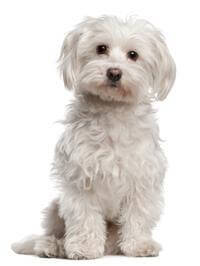Find products that match your dog’s needs

Do you love small, cuddly dogs with a zest for life? Then a Maltese might be your perfect pup! These adorable dogs, known for their long, white fur and big, expressive eyes, have been stealing hearts for centuries. But don't let their good looks fool you - Maltese dogs are also playful and energetic, making them fun companions for families or people who live alone. This article will tell you everything you need to know about this fluffy friend.
Keep these factors in mind before you bring a Maltese dog home:
Weight | 3 to 4 kg |
Height | 7 to 9 inches |
Lifespan | 12 to 15 years |
Coat | Single coat |
Note: The weight and height mentioned on the table is of a full-grown Maltese and not of a Maltese puppy.
The most recognisable feature of the Maltese is their long, luxurious coat of silky white fur that covers their entire body, including their face and legs. Some Maltese have unique 'black points' markings on their coat. Their long fur also gives owners the chance to experiment with fun grooming styles. Maltese coats typically come in three variations:
The Maltese breed is known for its charmingly small size, making them the perfect lapdog! If you're interested in adopting a purebred Maltese, here are some classic characteristics to look for:
Maltese dogs bring a delightful energy to any home. Their playful and gentle nature makes them ideal companions for those who enjoy games and cuddles. They are known for their affection, readily showering their love on their owners.
Maltese can thrive in various living situations. They get along well with children and seniors alike, making them adaptable family pets. These dogs can live with other pets, but it's best to introduce them to other animals when they're puppies so they get along.
Maltese dogs are happy with a moderate amount of attention. You can leave them alone for a short while, but if you're gone for too long, they might get lonely and start barking. To avoid this, give them plenty of love, playtime, and exercise to use up their energy. Generally, they are pretty quiet dogs and won't bark unless they really need to tell you something.
Maltese dogs are eager to please and respond well to positive reinforcement training. Starting obedience training during puppyhood lays a strong foundation for good behavior throughout their lives.
Socialisation is equally important. Gradually introduce your Maltese puppy to new people, animals, and environments in a positive and controlled way. This helps them feel confident and comfortable in various situations, reducing the likelihood of them barking at unfamiliar sights or sounds.
Training also helps build confidence in your Maltese. By teaching them basic commands and appropriate behaviour, you empower them to understand expectations and navigate their world comfortably. This reduces anxiety and minimises excessive barking.
Here’s all you need to know when preparing to look after a Maltese:
Maltese dogs are generally healthy, but like any dog breed, they do have some potential health concerns to keep in mind. Since they're a small dog breed, it's important to protect them from injuries caused by jumping or falls. They may be prone to issues like luxating patella (slipping kneecaps), Legge-Calve-Perthes Disease (affecting the hip joint), and dental problems. Some Maltese dogs can also develop liver conditions. To stay ahead of any potential health issues, regular vet check-ups are important. Your veterinarian can recommend preventative care and help catch any problems early, ensuring your Maltese lives a long and happy life.
The beautiful coat of Maltese is a joy to style, but it does take some work! Maltese hair grows continuously, so many owners opt for a shorter trim for easier care. If you love the look of a long coat, be prepared for daily or at least very frequent brushing to prevent mats. Regular professional grooming will also be needed. Baths once a month will keep that silky coat clean and soft. While you're caring for your Maltese, pay attention to their ears for any signs of infection, keep their nails trimmed, and consider a topknot to keep hair out of their eyes. Maltese can be prone to tear staining, so keep the eye area clean and dry. If staining is excessive, a vet visit is a good idea to rule out any health problems.
Maltese dogs are playful but don't need super long exercise sessions. Aim for around 30 minutes of daily activity, such as walks, playtime, or maybe even a short hike. Just remember that Maltese are sensitive to heat and cold, since they don't have an undercoat. In the winter, keep outdoor time shorter or protect them with a warm sweater.
Providing two nutritionally balanced meals a day is ideal for your Maltese. Choose a high-quality dog food specifically formulated for small breeds, as this ensures appropriate portion sizes and nutrients. To prevent obesity, monitor dog treat intake carefully. Consulting your veterinarian is always a wise choice. They can create a personalised diet plan for your Maltese based on their age, activity level, and any specific health considerations.
The origins of the Maltese dog can be traced back to the island of Malta in the Mediterranean. References to these captivating dogs can even be found on ancient Greek pottery, hinting at their long history. Legend has it that the famed philosopher Aristotle himself was a fancier of the Maltese breed.
Maltese dogs were also prized by Roman aristocrats, becoming a symbol of social status. However, with the fall of the Roman Empire, their numbers dwindled. Fortunately, the tradition of breeding Maltese continued in China, ensuring the survival of this beloved breed.
Maltese dogs can be good with other pets, especially if socialised as puppies. However, due to their small size, supervision is recommended around larger animals.
Yes, Maltese dogs can be wonderful family dogs! They are known for their sweet and gentle nature, making them affectionate dogs for families.
Maltese dogs may struggle with alone time. Consider crate training and enrichment activities to manage short separations and prevent barking from anxiety.
Maltese coats require regular maintenance, not necessarily difficult, but time-consuming. Daily brushing and professional grooming every 4-6 weeks are recommended.
Maltese dogs can be prone to barking, especially when left alone or feeling anxious. Proper training can help minimise barking.

Find a PEDIGREE® stockist
near you!
Buy online
Click to buy from any of the retailers below

